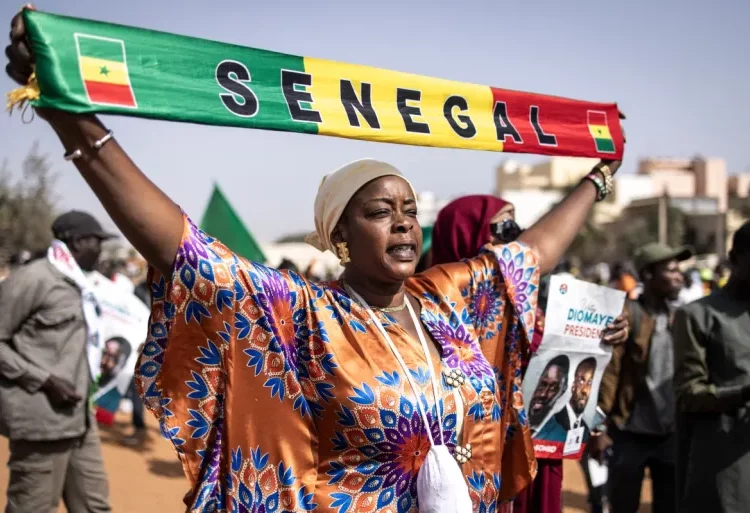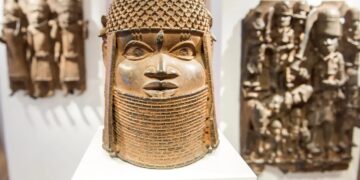There is a feeling of euphoria among the young and ordinary people of Senegal after 44-year-old Basirou Diomande Faye emerged from prison on March 16, 2024 and, just eight days later, won the presidential poll on March 24, 2024. It was a fitting conclusion to the political turmoil that attended that country’s last transition, a which threatened to boil over.
Faye, a former tax administrator, was a total newcomer to the country’s national politics having never contested an election nor held a political office.
Apart from Faye being the youngest to emerge president in Senegal, his victory also made it the first time an opposition candidate will claim victory in the first round of ballot. Running on an opposition alliance, African Patriots of Senegal for Work, Ethics and Fraternity (PASFEF) party, Faye garnered 54 percent of the vote to foreclose a run-off. His closest rival, Amadou Ba, former prime minster and candidate of the ruling alliance, the Alliance for the Peoples Republic (APR) party, who was heavily backed by former President Machy Sall, received about 37 percent of the vote.
Senegal’s election has ended in glory, but the road to it was paved with political crises in which main opposition figures, including Ousmane Sonko, and Faye himself, were jailed for flimsy reasons in a ploy to keep them out of the ballot.
Former President Macky Sall also attempted to put off the election billed for February 24 to much later in the year in an attempt to gain advantage for his protégé, Prime Minister Ba. But heightened opposition protests, intervention from ECOWAS, and a ruling from the country’s Constitutional Court forced his hand to hold the election as scheduled in March.
The Senegal election holds a few lessons for Africa and Nigeria in particular. First, it shows the power that young people can have in determining the course of their country through democratic political participation. .
In Nigeria, often, the youth who make up the largest demography are apathetic to political participation, including voting on election day. However, even though no youth emerged to shakeup the established political class which, as usual, presented the older generation in the three main parties in the presidential election – Peter Obi of Labour Party was 61; Atiku Abubakar of the PDP was 77, while Bola Tinubu of the ruling APC was 70, it offers hope that the ‘Not too Young to Run’ movement will one day result in young people taking over the reins from the old breed politicians.
Also, Nigerian youths should no longer be satisfied with eating crumbs from the table of the old politicians who, it has been clear, do not think about the next generation. Instead of hustling to be appointed aides and errand boys, the youth should aspire to the ultimate prize, the president, like it happened in Senegal.
Sadly, dearth of heavy war chest is given as a factor discouraging youths from jumping into the political fray – and even when they do, they are beholden to one political godfather or the other who provides financial and political support.
However, Faye emerged winner not because he could match the ruling power Franc for Franc, but his campaign, spearheaded by opposition leader Ousmane Sonko, utilized the power of the social media to offer political education and communicate their vision for the country to the youth segment, and galvanise them to turn out en masse on election day.
The Senegal election also shows that young people, who are disappointed by decades of poor governance, can come to power through constitutional means rather than through military coups, which have been the experience of West Africa of late, with soldiers seizing power in Mali, Guinea, Mali, Niger and Burkina Faso. Nigerian youths were dismayed after their failed attempt to change the political order in the last election; the Senegal experience should encourage them to keep engaging the system until they can have their way.
Another valuable lesson for Nigeria is the peaceful and transparent electoral process which received unanimous approbation. The conduct of the polls by the Senegalese Autonomous Electoral Commission was received with wide acceptance by the Senegalese people and praise by local and international observers. The European Union Observer Mission remarked that the election “took place in a calm environment and was well-organised” while the ECOWAS monitoring team reported that it was “smoothly” executed. President Sall, and his candidate Ba were among the first to concede victory to Faye, with the former declaring his victory as ‘a victory for Senegalese democracy.’ Sall did not try to manipulate the poll in favour of his choice candidate, against the people’s will, as we see in some countries, and nobody has gone to court to challenge the election. What this points to is that most politicians will accept the poll results if all parties abide by the rules, and the electoral umpire demonstrates impartiality. In Nigeria, only the electoral body and the ruling party or winning candidates accept that an election has been well conducted and credible.
Allied to this is the high voter turnout. The electoral system made it easy for all citizens within the suffrage age to vote easily with a simple identification as a Senegalese citizen, the national identity card. In Nigeria, millions are disenfranchised because they can’t get a voter card due to the cumbersome process and the deliberate ploy by some mischievous elements to stop persons from certain areas from expressing their democratic choices.
Another lesson from Faye’s victory is that he campaigned on issues, not on tribal or religious sentiment: his campaign was premised on fighting corruption, especially as it concerns its natural resources, and reviewing the country’s relations with foreign powers, especially its former colonial master, France. In Nigeria, primordial issues becloud sound ideas.
Finally, African politicians can learn from Senegal about a peaceful transition from a ruling government to an opposition party in respect of the popular will. That is the beauty of democracy and Senegal has once again demonstrated its long-held reputation as the bastion of democracy in Africa.
We’ve got the edge. Get real-time reports, breaking scoops, and exclusive angles delivered straight to your phone. Don’t settle for stale news. Join LEADERSHIP NEWS on WhatsApp for 24/7 updates →
Join Our WhatsApp Channel










